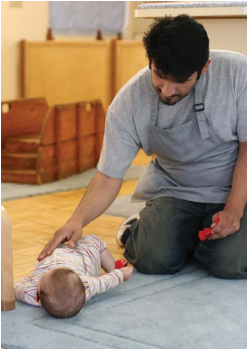77 15.4: Rights of the Child
The United Nations Convention on the Rights of the Child applies to all children, whatever their race, religion or abilities; whatever they think or say, whatever type of family they come from. It doesn’t matter where children live, what language they speak, what their families do, whether they are boys or girls, what their culture is, whether they have a disability or whether they are rich or poor. No child should be treated unfairly on any basis. (UNICEF 1990, 1)
On the surface, the need to bring up racism, classism, or sexism would seem to be incongruous in the same breath as talking about childcare for children. Yet, sadly, it is necessary. Prejudice, bias, and societal inequity enter the lives of children in a variety of ways. Whether based on race, culture, gender, economic class, or family structure, these attitudes and realities have a negative, hurtful effect on the quality of life and development.
Although the child’s immediate and extended family provides the primary environment of socialization for children in their early years, bias, prejudice, and societal inequity come from outside of the family. The professionals who provide children and their families with a range of services (e.g., child care providers, medical staff, social workers) are one source of the messages that convey whose way of life matters more and whose matters less. Some of these messages are obvious, some are subtle, and ironically, many are unintended. Some negative messages come from the attitudes and behaviors of the professionals. Many come from structural dynamics of the organizations in which human service professionals, including early childhood educators, work. These negative messages may include unexamined policies, procedures, and beliefs that create advantages for some groups and disadvantages for other groups.
The cumulative effect of messages about who matters (more or less) gradually influences how children begin to understand and feel about themselves and others—even in the first year of life. The messages also impact their quality of life. An understanding of the various forms of bias, prejudice, and inequity and how they influence children is critical to counteract potential damage to healthy development. Understanding grows from awareness, the first step to practicing culturally responsive, non-biased care that nurtures all children and families. [245]

Ethical Responsibilities To Families
In their Code of Ethical Conduct and Statement of Commitment position statement , the National Association for the Education of Young Children shares the core values underscoring ethical behavior in the field of early childhood care and education. These are:
- “Appreciate childhood as a unique and valuable stage of the human life cycle
- Base our work on knowledge of how children develop and learn
- Appreciate and support the bond between the child and family
- Recognize that children are best understood and supported in the context of family, culture, community, and society
- Respect the dignity, worth, and uniqueness of each individual (child, family member, and colleague)
- Respect diversity in children, families, and colleagues
- Recognize that children and adults achieve their full potential in the context of relationships that are based on trust and respect”
They also detail the ethical responsibilities that early childhood educators have that affirm commitment to the core values. In the section that shares ethical responsibilities to families, the following are included:
- Welcome all family members and encourage their participation in the program
- “Respect the dignity and preferences of each family and make an effort to learn about its structure, culture, language, customs, and beliefs to ensure a culturally consistent environment for all children and families”
- Respect families’ childrearing values and involve them in making decisions for their children
- Make every effort to communicate effectively with families in a language they understand
- Use families input when planning and implementing the program
And in the statement of commitment portion of the position statement, two of the commitments that early childhood educators make include:
- “Respect and support families in their task of nurturing children
- Engage in an ongoing process of self-reflection, realizing that personal characteristics, biases, and beliefs have an impact on children and families.” [247]

